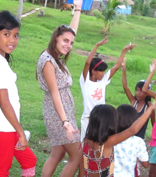-

- 951 NW 13th St.3E Boca Raton, FL 33486 (561) 864-0298 info@bicolclinic.org
-

-


Volunteer: Lucia Sirota
Bicol Clinic Foundation, Inc.
Philippines, 2011
My experience in the Philippines and being able to participate in the efforts of the Bicol Clinic is honestly difficult for me to convey in words. I left the Philippines with a feeling that was so overwhelmingly powerful that it took me at least a week after my return to be able to really describe what that feeling was. I finally came to conclusion that I returned to the United States with the strongest feeling of hope that I have ever felt. Never in my life have I been to country with such suffering and poverty, yet full of people whose smiles and gestures radiate hope. I can cite two memories in particular that I constantly re-play in my mind and remind me of the important lessons I gained in the Philippines.
I absolutely loved working in the clinic. I have always been fascinated by medicine but throughout college I focused solely on mental health. It was such a privilege to be able to work in the clinic with such passionate and talented doctors, medical students and translators and witness first-hand the process of treating patients. There is nothing more crucial to human survival than our physiological well-being. The couple of hours that I assisted in the surgery room were two hours of my life that I will never forget. Being able to improve another person's life, specifically through medicine, was the most exhilarating, rewarding and humbling experience of my life. I will never forget the faces of the patients that exuded gratitude and relief and the facial expressions of the doctors, students and translators that conveyed pride and such happiness to have been able to help. The clinic was full of hope, from every individual that walked through the building and that hope will be a part of me for the rest of my life.
Working in the schools in Sorsogon and Bulan was undoubtedly an unforgettable experience. If the doctors and patients from the clinic showed hope, then the children from these schools radiated the greatest optimism and enthusiasm I have ever seen in people or children. I became aware of the impact we were truly making in that community when after our presentations in Sorsogon, a group of children came running down the hill by the clinic screaming "waka waka!" at me. In Sorsogon we taught in the high school and at the end of a couple of the presentations I tried to engage the students in a dance called waka waka. The children that came running to me were of age to be in elementary school. This meant that their older siblings, cousins, friends, neighbors, etc. had told them about their experiences with us with at school. It is difficult for us to believe in making a change because in our society to achieve change means not only challenging the issue face to face, but also tackling the different forms of technology, media and social networks to be able to spread information and have a widespread effect. In communities like the ones in Sorsogon and Bulan, the impact of philanthropic efforts remains in the interactions face to face. This provided me with an extremely positive outlook on working in communities such as these and being able to truly make a change and improve the peoples' well being.
Like I mentioned before, it is very difficult to articulate the life-changing experience that was working with the Bicol Clinic, teaching at the schools and spending time with the incredibly generous, kind and accommodating Lacsa family. After graduating I questioned so harshly my future, what I really wanted to accomplish and which career path I wanted to follow. However, as soon as I stepped on the plane to Los Angeles in Manila, I knew that whatever I did from that moment forward needed to involve helping and it had to involve people. I realize that is not even close to a "career goal" (whatever that is) nevertheless these experiences allowed me to understand the importance of acknowledging the privileges I have been lucky to live and recognizing that life is not worth living if you let others around you (and I'm referring to around the globe) suffer and endure the hardships of poverty and sickness.
Lucia Sirota
Tulane University
Volunteer
Want To Join Our Team?
BCF has dispatched more than 150 medical students, in addition to dozens of American and foreign physicians and nurses, to provide care to more than 75,000 patients in the Philippines, Nepal and Haiti, many of whom had never before seen a physician. Our team members also volunteer in orphanages and schools to extend health care to other aspects of life. We’d love for you to be Part of the Start!
Join Our TeamThe application and all additional requirements MUST BE SUBMITTED BY January 21 , 2020.
